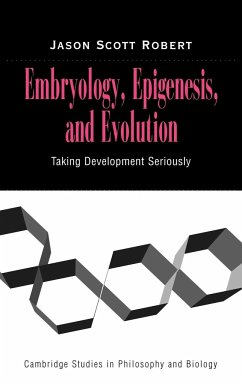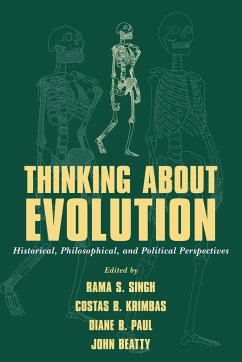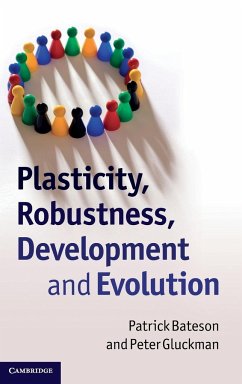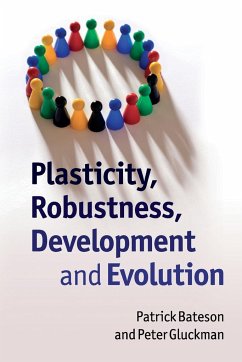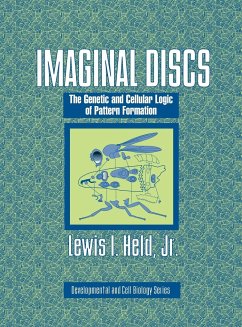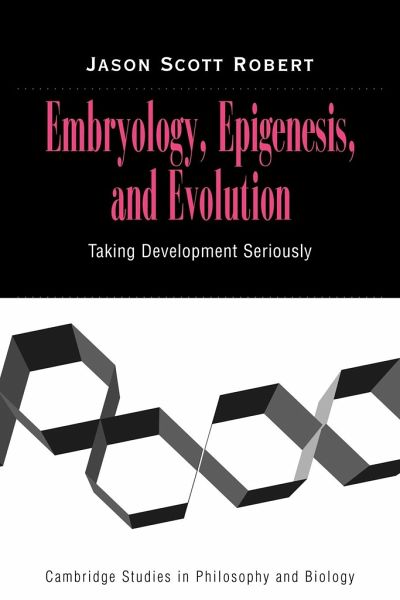
Embryology, Epigenesis and Evolution
Taking Development Seriously
Versandkostenfrei!
Versandfertig in 1-2 Wochen
43,99 €
inkl. MwSt.
Weitere Ausgaben:

PAYBACK Punkte
22 °P sammeln!
This book explores the nature of development against current trends in biological theory and practice.Historically, philosophers of biology have tended to sidestep the problem of development by focusing primarily on evolutionary biology and, more recently, on molecular biology and genetics. Quite often too, development has been misunderstood as simply, or even primarily, a matter of gene activation and regulation. Nowadays a growing number of philosophers of science are focusing their analyses on the complexities of development, and in Embryology, Epigenesis and Evolution Jason Scott Robert ex...
This book explores the nature of development against current trends in biological theory and practice.
Historically, philosophers of biology have tended to sidestep the problem of development by focusing primarily on evolutionary biology and, more recently, on molecular biology and genetics. Quite often too, development has been misunderstood as simply, or even primarily, a matter of gene activation and regulation. Nowadays a growing number of philosophers of science are focusing their analyses on the complexities of development, and in Embryology, Epigenesis and Evolution Jason Scott Robert explores the nature of development against current trends in biological theory and practice and looks at the interrelations between development and evolution (evo-devo), an area of resurgent biological interest. Clearly written, this book should be of interest to students and professionals in the philosophy of science and the philosophy of biology.
Review quote:
'The dust jacket of Embryology, Epigenesis, and Evolution suggests a target audience of philosophers of science and of biology, but I hope the book will be more widely read. It might start a productive exchange between biologists and philosophers on how to overcome the limitations of our knowledge.' Science
'- exceptionally lucid'. Notre Dame Philosophical Reviews
'Robert is a well published philosopher of biology who has tackled what he sees as genomania in the disciplines of developmental and evolutionary biology. - Robert switches back and forth from philosophical analysis to biological examples, which I found to be an interesting and intellectually stimulating format. - Robert presents his arguments clearly and concisely - I recommend that you read this book for its philosophical analyses and, if you are not already, start taking development seriously.' TRENDS in Ecology and Evolution
Table of contents:
List of figures; Preface; 1. The problem of development; 2. Exemplars; 3. Scylla and Charybdis; 4. Constitutive epigenetics; 5. Creative development; 6. A new synthesis?; 7. The devil is in the Gestalt; Endnotes; Bibliography; Index.
Historically, philosophers of biology have tended to sidestep the problem of development by focusing primarily on evolutionary biology and, more recently, on molecular biology and genetics. Quite often too, development has been misunderstood as simply, or even primarily, a matter of gene activation and regulation. Nowadays a growing number of philosophers of science are focusing their analyses on the complexities of development, and in Embryology, Epigenesis and Evolution Jason Scott Robert explores the nature of development against current trends in biological theory and practice and looks at the interrelations between development and evolution (evo-devo), an area of resurgent biological interest. Clearly written, this book should be of interest to students and professionals in the philosophy of science and the philosophy of biology.
Review quote:
'The dust jacket of Embryology, Epigenesis, and Evolution suggests a target audience of philosophers of science and of biology, but I hope the book will be more widely read. It might start a productive exchange between biologists and philosophers on how to overcome the limitations of our knowledge.' Science
'- exceptionally lucid'. Notre Dame Philosophical Reviews
'Robert is a well published philosopher of biology who has tackled what he sees as genomania in the disciplines of developmental and evolutionary biology. - Robert switches back and forth from philosophical analysis to biological examples, which I found to be an interesting and intellectually stimulating format. - Robert presents his arguments clearly and concisely - I recommend that you read this book for its philosophical analyses and, if you are not already, start taking development seriously.' TRENDS in Ecology and Evolution
Table of contents:
List of figures; Preface; 1. The problem of development; 2. Exemplars; 3. Scylla and Charybdis; 4. Constitutive epigenetics; 5. Creative development; 6. A new synthesis?; 7. The devil is in the Gestalt; Endnotes; Bibliography; Index.





